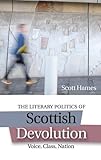The Literary Politics of Scottish Devolution : Voice, Class, Nation / Scott Hames.
Material type: TextPublisher: Edinburgh : Edinburgh University Press, [2022]Copyright date: ©2019Description: 1 online resource (352 p.)Content type:
TextPublisher: Edinburgh : Edinburgh University Press, [2022]Copyright date: ©2019Description: 1 online resource (352 p.)Content type: - 9781474418133
- 9781474418157
- 320.94110905 23
- online - DeGruyter
| Item type | Current library | Call number | URL | Status | Notes | Barcode | |
|---|---|---|---|---|---|---|---|
 eBook
eBook
|
Biblioteca "Angelicum" Pont. Univ. S.Tommaso d'Aquino Nuvola online | online - DeGruyter (Browse shelf(Opens below)) | Online access | Not for loan (Accesso limitato) | Accesso per gli utenti autorizzati / Access for authorized users | (dgr)9781474418157 |
Frontmatter -- Contents -- Preface -- Acknowledgements -- Introduction: The Dream and the Grind -- 1. Chaps with Claymores to Grind: Literary and Political Nationalism 1967–79 -- 2. Machine Politics of British Devolution 1967–79 -- 3. The Scottish Dimension: Cultural and Constitutional Politics 1979–87 -- 4. Claims of Right: Self-Determination and Consensus 1987–92 -- 5. And the Land Lay Still: Curating Devolution with James Robertson -- 6. Language Nationalism and Vernacular Literary Space -- 7. Devolution and the Spectacle of Voice: Irvine Welsh, A. L. Kennedy, James Kelman -- Conclusion -- Bibliography -- Index
restricted access online access with authorization star
http://purl.org/coar/access_right/c_16ec
Provides a cultural history and political critique of Scottish devolutionProvides the first critical history of Scottish devolutionOffers the first multidisciplinary study of (UK or Scottish) devolution: engaging extensively with the work of historians, sociologists, political scientists and cultural theoristsCombines close attention to political and electoral factors with cultural issues and developments Draws on political theory which illuminates devolution from outside its terms This book is about the role of writers and intellectuals in shaping constitutional change. Considering an unprecedented range of literary, political and archival materials, it explores how questions of ‘voice’, language and identity featured in debates leading to the new Scottish Parliament in 1999. Tracing both the ‘dream’ of cultural empowerment and the ‘grind’ of electoral strategy, it reconstructs the influence of magazines such as Scottish International, Radical Scotland, Cencrastus and Edinburgh Review, and sets the fiction of William McIlvanney, James Kelman, Irvine Welsh, A. L. Kennedy and James Robertson within a radically altered picture of devolved Scotland.
Mode of access: Internet via World Wide Web.
In English.
Description based on online resource; title from PDF title page (publisher's Web site, viewed 29. Jun 2022)


